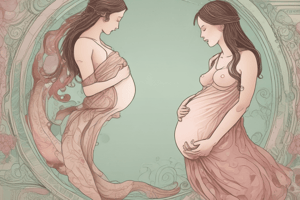Podcast
Questions and Answers
What is a leading cause of maternal and perinatal mortality worldwide?
What is a leading cause of maternal and perinatal mortality worldwide?
- Pregnancy-induced hypertension
- Gestational diabetes
- Postpartum hemorrhage
- Hypertensive disorders of pregnancy (correct)
What percentage of pregnant women are complicated by preeclampsia?
What percentage of pregnant women are complicated by preeclampsia?
- 1-5 in 100 (correct)
- 5-10 in 100
- 20-50 in 100
- 10-20 in 100
What is the minimum systolic blood pressure required for a diagnosis of preeclampsia?
What is the minimum systolic blood pressure required for a diagnosis of preeclampsia?
- 130 mm Hg
- 160 mm Hg
- 150 mm Hg
- 140 mm Hg (correct)
What is one of the new onset conditions required for a diagnosis of preeclampsia?
What is one of the new onset conditions required for a diagnosis of preeclampsia?
What is the minimum protein: creatinine ratio required for a diagnosis of proteinuria?
What is the minimum protein: creatinine ratio required for a diagnosis of proteinuria?
What is an example of maternal organ dysfunction in preeclampsia?
What is an example of maternal organ dysfunction in preeclampsia?
What is an example of uteroplacental dysfunction in preeclampsia?
What is an example of uteroplacental dysfunction in preeclampsia?
Which organization defines preeclampsia as systolic blood pressure at ≥140 mm Hg and/or diastolic blood pressure at ≥90 mm Hg?
Which organization defines preeclampsia as systolic blood pressure at ≥140 mm Hg and/or diastolic blood pressure at ≥90 mm Hg?
What is the gestational age at which preeclampsia can occur?
What is the gestational age at which preeclampsia can occur?
Study Notes
Hypertensive Disorders in Pregnancy
- Hypertensive disorders of pregnancy are a leading cause of maternal and perinatal mortality worldwide.
Definitions and Diagnostic Criteria
- Preeclampsia (PE) is defined as:
- Systolic blood pressure at ≥140 mm Hg
- Diastolic blood pressure at ≥90 mm Hg in normotensive women
- Accompanied by one or more of the following new onset conditions at or after 20 weeks of gestation
- Conditions that accompany PE:
- Proteinuria (≥30 mg/mol protein: creatinine ratio; ≥300 mg/24 hour; or ≥2+ dipstick)
- Evidence of other maternal organ dysfunction:
- Acute kidney injury
- Liver involvement
- Neurological complications
- Hematological complications
- Uteroplacental dysfunction:
- Fetal growth restriction
- Abnormal umbilical artery doppler waveform analysis
- Stillbirth
Studying That Suits You
Use AI to generate personalized quizzes and flashcards to suit your learning preferences.
Description
This quiz covers the basics of hypertensive disorders in pregnancy, including definitions, diagnostic criteria, risk factors, and management plans. It's a great resource for OB/GYN students and professionals.




